He divided his time between the Winnipeg Maple Leafs (3 games) and the Strathconas, scoring 11 goals in 5 games. For the 1908-09 season he remained in Winnipeg, only now wit the Winnipeg Shamrocks where he put up an impressive 17 goals and 24 points in nine games.
Dunderdale moved back east for the 1909-10 season to play with the Montreal Shamrocks. The club started the season in the Canadian Hockey Association where he scored 7 goals in 3 games before the league collapsed. The club then joined the National Hockey Association for the remainder of the season, and in 12 games he posted 14 additional goals.
with the Montreal Shamrocks
He again remained in the NHA for the 1910-11 season, only now with the Quebec Bulldogs, with whom he finished second in team scoring with 13 goals in just 9 of the team's 16 games.
Dunderdale was lured west by the Patrick brothers, Frank and Lester, and their new Pacific Coast Hockey Association. He joined Lester's Victoria Senators club for the 1911-12 season. He led Victoria in scoring with 24 goals in 16 games to finish third in the league.
He put up similar numbers for the Senators in 1912-13 when he scored an identical 24 goals plus 5 assists for 29 points in 15 games to dominate the league scoring race, with 10 more goals and 9 more points than any other player.
He remained with Victoria for the 1913-14 season, who were now rechristened the Aristocrats. His 24 goals tied for the league lead but a lack of assists left him second on the team and third in the league scoring race, but Victoria won the league title for the second consecutive year. With the PCHA now recognized as an established league, Victoria traveled east to challenge the Toronto Blueshirts of the NHA for the Stanley Cup, who defended their cup three games to none.
The Aristocrats had a poor 1914-15 season with just 4 wins from 17 games, which affected Dunderdale's scoring totals. He led the team with 17 goals and 10 assists, but dropped to sixth overall in the league.
For the 1915-16 season, Dunderdale moved south to the United States to play for the second year Portland Rosebuds, who promptly won the PCHA championship and traveled east to face the Montreal Canadiens for the rights to the Stanley Cup, becoming the first American team to play for the cup, a challenge won by Montreal three games to two.
For the 1916-17 season, Dunderdale scored 22 goals in 24 games an finished tenth in PCHA scoring and third on the Rosebuds. What really stood out though, was his league record 141 penalty minutes to lead the league, nearly 100 more than he had ever totaled previously!
He would play one final season with Portland in 1917-18, scoring 14 goals and returning to Earth with 57 penalty minutes, still the second highest of his entire career.
For the 1918-19 season, Dunderdale was once again a member of the reborn Aristocrats following some somewhat complex franchise shifting. During Dunderdale's time in Portland, the Aristocrats lost use of the Patrick Arena when it was commandeered by the Canadian military for use during World War I. The franchise, having lost their home, moved to Spokane, Washington and played one season as the Canaries before folding. With the Patrick Arena once again available in 1918, the Victoria Aristocrats franchise was revived and stocked with players from the Rosebuds, who had ceased operations. After scoring just 9 points in his first season back in Victoria, Dunderdale regained his form with 26 goals and 33 points in 1919-20 to win his second PCHA scoring title.
He scored 9 goals and 20 points in 1920-21 to once again place in the top ten in league scoring for the Aristocrats, who changed their name to the Cougars for the 1921-22 season, during which Dunderdale racked up 19 points in 24 games, good for second on the club, which included becoming the first player to score on a penalty shot on December 12, 1921 against the Seattle Metropolitans Hugh Lehman. The penalty shot was just one of the many innovations the Patricks introduced when they ran the PCHA that have carried through to today's modern game. Oddly, in 27 games of the 1922-23 season, Dunderdale's total offensive output was a mere 2 goals, which proved to be his last with Victoria.
For the 1923-24 season, Dunderdale left the PCHA and signed with the Saskatoon Crescents of the Western Coast Hockey League, with whom he played six games before moving to the Edmonton Eskimos for the final 11 games of his career.
Dunderdale's final combined career totals are 320 games with 279 goals and 71 assists for 350 points, well over a point per game for his career. His 194 goals made him the all-time PCHA leader and he was named a PCHA all-star six times and became the only Australian-born player elected to the Hockey Hall of Fame in 1974.
Today's featured jersey is a 1913-14 Victoria Aristocrats Tommy Dunderdale jersey. After starting out life wearing barberpole jerseys at the Victoria Senators, the club changed to the unique sash style jerseys as the Aristocrats. In 1922, the franchise changed names once again, this time to the Cougars, and adopted the colors of light blue and yellow.

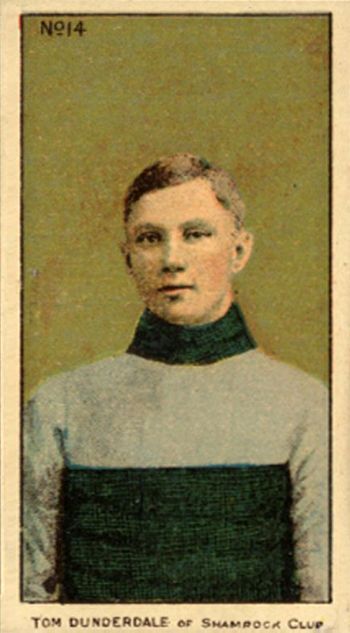
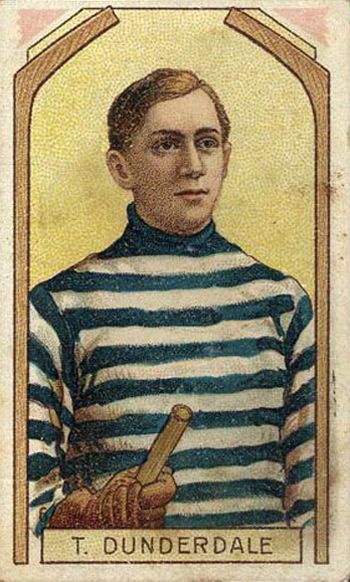
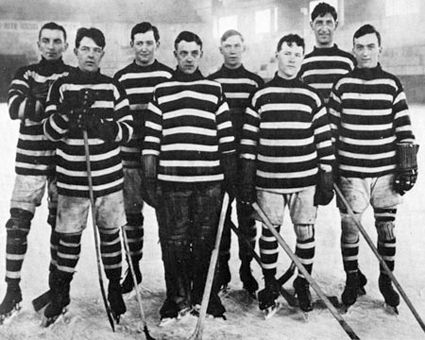
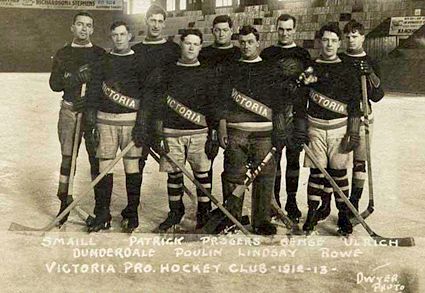
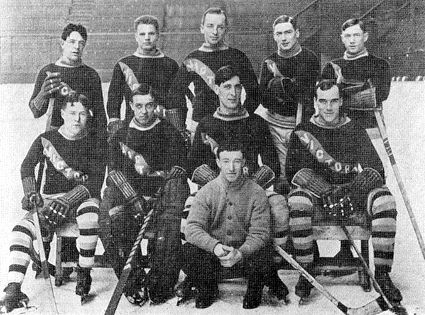
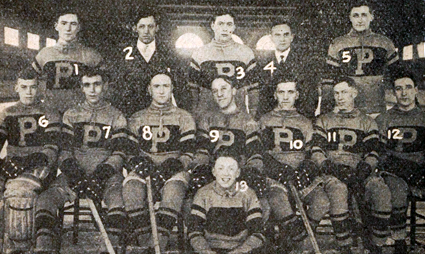
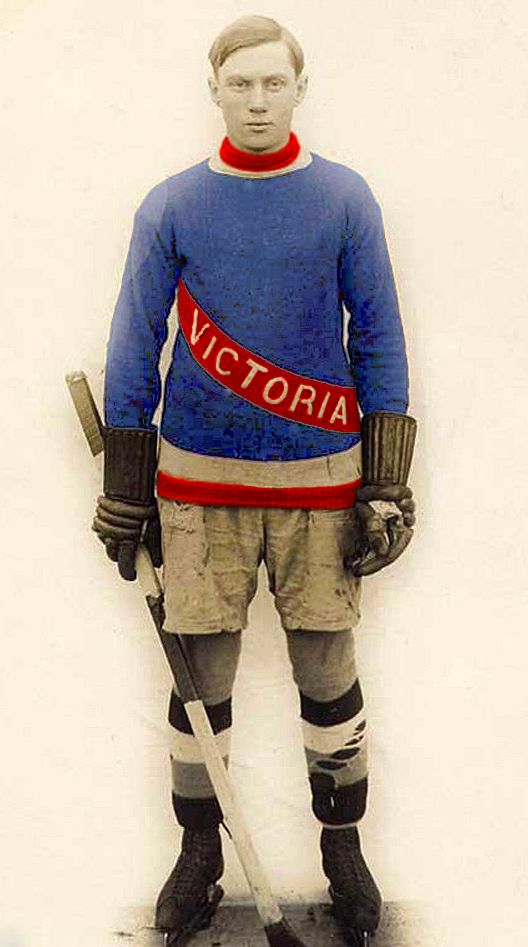










The original Victoria Aristocrats franchise wore red sweaters with blue trim - not blue as shown here. It's documented in several eastern papers from that period. The reason this misconception persists is because red appears darker than blue in b&w photographs from that era and because of the illustrations in the book "trail of the Stanley Cup" by noted historian Charles Coleman.
ReplyDeleteNote this picture of the 1915 Montreal Canadiens. Notice how the red appears much darker than their blue trim? I rest my case.
http://hockeygods.com/system/gallery_images/12362/normal.png?1404975095